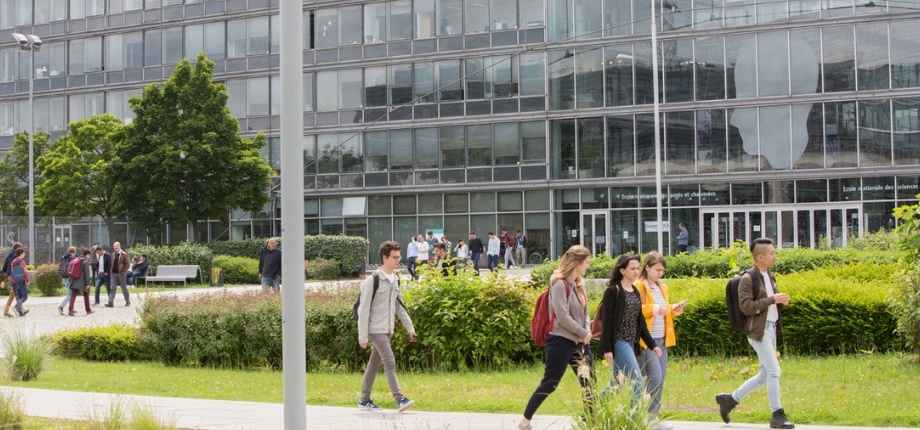Respect for others

Respect for each individual is at the heart of the École nationale des ponts et chaussées' concerns, whether for students or staff. This is reflected in two major themes: the establishment of real and quantifiable equality between women and men, and the fight against gender-based and sexual violence and all forms of discrimination.
École nationale des ponts et chaussées has drawn up a new action plan to ensure professional equality between men and women, approved by the School Council on March 13, 2025, after being presented to the Social Committee on March 5, 2025.
Building on previous actions taken as part of the first plan drawn up for the 2022-2024 period, such as a gross compensation barometer, training and awareness-raising on gender and diversity issues, the prevention of sexual harassment and sexism, and the introduction of a reporting and psychological support system, we have decided on new, committing measures:
- Implementation of a mentoring program dedicated to research, with senior female researchers mentoring junior female researchers.
- Mandatory training for managers on equal access to positions, gender issues, harassment and sexism.
- Promotion of professional equality through a special feature in Ingenius magazine on gender issues in research.
- Training for staff who may be called upon to talk to victims of sexual and gender-based violence (SGBV).
A plan drawn up by the network of professional equality referents, representing each department of École nationale des ponts et chaussées, the School's professional equality referent, his collaborator and staff representatives.
The School's professional equality referent, supported by his collaborator and the General Secretariat, is responsible for providing information, raising awareness, advising employees and departments, taking part in the assessment and diagnosis of the equal opportunity policy, and monitoring the implementation of actions undertaken within the School.
Assisted by his assistant, he also relies on the network of equal opportunity advisors within the departments to carry out his mission.
Every year, the "Union des Professeurs de Sciences et Techniques Industrielles" (UPSTI) organizes FIRST, "Femmes & Ingénieures, Réussir en Sciences et Technologies", a day to raise awareness of scientific and technological careers among secondary school girls.
For half a day, women engineers, technicians and students from all over France provide information and share their experience and passion for their profession or the future careers they are aiming for with secondary school girls. École nationale des ponts et chaussées is a partner in this event promoting gender diversity in engineering, which will help to remove obstacles, combat stereotypes, make progress towards gender diversity in scientific and technological fields, and reveal talents that are not yet known, so that tomorrow's industry can also be built by women.
École Nationale des Ponts et Chaussées is committed to raising awareness and preventing sexual and gender-based violence (SGBV). The program to combat SGBV includes a support program for victims and witnesses, aimed at both students and employees.
Awareness / Prevention
For students
- A day to raise awareness of harassment and the various forms of SGBV is part of the back-to-school program for all engineering students.
- Students sign the charter of respect for others, which sets out the principles and behavior expected in the School and outside the academic environment. It is presented in the lecture hall to all students entering the engineering program.
- A leaflet describing the measures taken to combar SGBV is distributed to all students at the start of the school year.
For staff
- Two SGBV awareness-raising webinars were organized during the first half of 2023.
- They were supplemented by awareness-raising sessions for teaching staff and lexturers.
Training
For students
- All students are trained in the identification of SGBV situations and their legal framework through case studies in small groups from the 1st year of the engineering program.
- All students are trained in the prevention of psycho-social risks and the notion of consent as part of their curriculum.
- Those in charge of student associations are obliged to take part in in-depth training sessions on liability and the supervision of students in their role as organizers of associative life.
For staff
- The Human Resources department offers a training course, provided by the Safe Campus association, to combat SGBV in the workplace, via the MENTOR interministerial training platform.
- Three more in-depth training courses are also available for staff working with students, and for those supervising staff members.
Victims and witnesses support - reporting
For students and PhD students
- The School's prevention and listening unit offers victims and witnesses an initial confidential face-to-face or remote reception. You can also contact us by e-mail: safe@enpc.fr.
- Students and PhD students who need information about behavior that seems inappropriate or find themselves in difficulty (including witnesses and victims of sexual harassment) are invited to contact Elisabeth Beyls (office P 204), in charge of Equality-Diversity-Student Life, for guidance. If necessary, they can be helped to file a report.
- It is possible to make a report on the secure external platform www.enpc.signalement.net. Confidentiality is guaranteed from the moment the alert is issued and throughout the entire procedure.
A tutorial on how to use the platform is available on eductv.enpc.fr. - The School has signed an agreement with the Nightline France association, which offers a night-time counselling service, from 9pm to 2.30am, in French and English, by and for students.
Online chat: nightline-paris.fr
+33 1 88 32 12 32 (French) - 7 days a week, 9pm-2.30pm.
+33 1 88 32 12 33 (English) - Thurs. to Mon. 9pm-2.30am. - A psychologist can offer free counseling sessions to students and PhD candidates. Book an appointment: go.qualisocial.com/mwjb
Download the leaflet about the psychologist office hours (French)
For staff
- The www.enpc.signalement.net secure reporting platform enables you to file reports and exchange confidential information with the School's trusted advisors.
- A tutorial on how to use the platform is available on eductv.enpc.fr.
- The PROS-CONSULTE platform for listening, psychological support and advice (anonymous) is available 24/7.
Toll-free number: +33 0800 730 987. - The chool has a preventive medicine center.
École nationale des ponts et chaussées is a signatory of #StOpE - Stop Ordinary Sexism in the Workplace, the first inter-company initiative to combat so-called “ordinary” sexism in the workplace, launched in December 2018 by Accor, EY and L'Oréal alongside 30 companies and organizations. Since its inception, more than 140 organizations have joined the #StOpE initiative.
An inclusive School: supporting students with disabilities during their studies
École Nationale des Ponts et Chaussées has long been committed to a responsible, civic-minded approach in which the inclusion of people with disabilities is identified as an asset. In line with these convictions, the School has set up actions and services for students with special needs, and has established an active policy of taking disability into account, welcoming disabled employees and students.
Our medical service, with its nurse and doctor, works closely with our teachers, who are committed to the inclusion of our students, ensuring that the quality of care is maintained throughout their studies.
The premises are adapted to accommodate people with reduced mobility.
Would you like more information, or have a specific question that you haven't found the answer to on our website? Contact Laurence Nizier, Handicap Representative
Article 3 of the law of August 24, 2021 consolidating the principles of the Republic established the role of the secular referent. Decree no. 2021-1802 on secular referents in the civil service was published in the Journal Officiel on December 26, 2021. It defines the missions, procedures and criteria for appointing secularity referents within each State administration, local authority or public establishment. This referent is responsible for providing any useful advice on compliance with the principle of secularism to agents or department heads who consult him or her.
Julien Becker, Deputy General Secretary, has been appointed as the École nationale des ponts et chaussées' secular referent, for employees only, by decision of the Director on November 7, 2022.
If you have any queries on this subject, please send an email.
Principle of secularism: frequently asked questions
1. Are teachers free to express their religious beliefs?
No, a teacher, as opposed to a user, may not wear clothing that would be tantamount to proselytizing or the conspicuous display of a religious affiliation, nor may he or she make remarks that would constitute proselytizing. This principle applies to all public employees working in the School, whether or not they are in contact with users.
2. Are students free to display their religious beliefs?
Yes, but this right is not absolute; it is limited :
- by the prohibition on proselytizing (incitement to wear religious symbols, disruption of teaching, provocation, propaganda, use of religious books, etc.) ;
- health and safety constraints.
For these reasons, the wearing of certain types of clothing may be prohibited during certain lessons, for practical work requiring manipulations, or during sporting activities, for example. The same applies to clothing that does not allow direct identification of a student inside the premises.
3. Is a teacher free to refuse to teach a student because of his or her religion?
No. Refusing to teach a student because of religious symbols is discriminatory and, as such, punishable under article 40 of the Code of Criminal Procedure. Similarly, refusal to teach on the grounds of a student's gender, disability, sexual orientation, appearance or ethnic origin is liable to the same penalties. Note, however, that this principle is not absolute: refusal to teach may be justified in the case of certain courses involving particular health and safety constraints.
4. Can a student challenge a teacher on the grounds of gender/religion?
No, a student cannot challenge the co-educational nature of the course. Nor can they refuse to take part in the practical exercises included in the course on the grounds that these would run counter to their beliefs.
Similarly, a student may not refuse to take part in an examination on the grounds that his or her religion supposedly advocates the separation of the sexes, as this situation is liable to result in prosecution before the ordinary civil and criminal courts. The same applies to cases where considerations of gender, religion or sexual orientation, as well as political or philosophical considerations, lead a student not to take a written or oral exam, or to question the subjects of exam papers.
5. Can students request changes to exam or course dates for religious reasons?
No. Wherever possible, schools try to accommodate the dates of major religious holidays when organizing exams, but they are under no obligation to meet the demands of religious groups in this area. Oral examinations, which are held over several days, may be subject to greater flexibility, but this decision remains at the discretion of the teacher responsible for the tests.
6. Is a student allowed to pray on School premises?
No. The act of praying is contrary to the principle of secularity and is therefore forbidden, whether individually or collectively. In accordance with the law and the provisions of article 22 of the School's internal regulations, the provision of a permanent or even occasional “prayer room” would seriously contravene the principle of secularism and the principle of equality.
